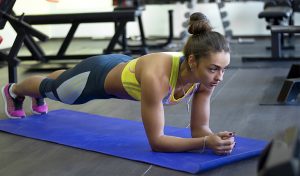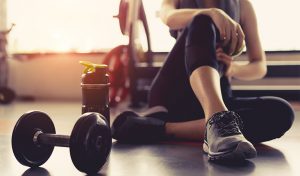Should You Keep The AC On While Working Out?
By Dr. Nikita Toshi +2 more

Get,

to manage your symptom
Get your,


4 Cr+ families
benefitted

OTP sent to 9988776655



You’ve successfully subscribed to receive
doctor-approved tips on
Whatsapp

Get ready to feel your best.

Hi There,
Download the PharmEasy App now!!


Register to Avail the Offer
Send OTPBy continuing, you agree with our Privacy Policy and Terms and Conditions

Hi There,
Sign up on PharmEasy now!!
Trusted by 4 crore+ families

OTP sent to 9988776655



You have unlocked 25% off on medicines




Code: NU25
By Dr. Nikita Toshi +2 more
What are the first few things you enquire about when you want to join a new gym? The exercise equipment, the timings, and the fees. One other thing that many people ask is whether the gym is air-conditioned or not. This is because working out means a lot of sweating, which is not very comfortable. And especially in our climate, exercising without air conditioning is unthinkable to most.

So, should you keep the AC on during workouts? Let’s find out.
Table of Contents
You probably know that you have to warm up before you start your exercise routine. But warming up takes a lot of time when you do it in an air-conditioned room. What does that mean? It means that you will be using a lot of energy just to warm up and you will be left with very little stamina to go through your main routine afterwards.

Exercising in a hot environment might be good for short activities that need powerful muscle contractions. There is also a school of thought that light-intensity workouts, such as yoga, can benefit because the extra strain on the heart during exercise in the heat can increase the number of calories you burn. But research by Central Michigan University showed that there was no difference in exercise intensity, so the amount of calories burnt doing yoga at 20⁰C and 35⁰C were the same.
Dr. M.G. Kartheeka, MBBS, MD(Pediatrics)
The goal of exercising is to keep your body warm because that is the only way you can burn calories. But in an air-conditioned room, your body does not stay warm for long periods and tends to cool down often. What does this imply? Your body will burn fewer calories even though you exercise for long periods.
When you take quick breaks in between sets, your body will lose heat due to the AC. And when you resume your workout, you will have to work extra hard to warm up your body again. At the end of the session, although you will be left exhausted, you will have burnt fewer calories than expected.
One of the chief benefits of working out is detoxification. Your body gets rid of harmful substances through sweating. The more you sweat, the cleaner your system becomes. But how much do you sweat when you work out in an AC gym? Not much! So that means, your body will not be able to expel many toxins.
In the cold, your body can regulate its temperature a little better, meaning you can often exercise farther or longer, so you can burn more calories, working out at optimal temperatures that suit your body is more important.
Dr. Ashish Bajaj, M.B.B.S., M.D. in Clinical Pharmacology and Toxicology
What is the purpose of a cardio workout? It makes your heartbeat faster, which in turn generates heat to burn up the calories. And normal temperatures are ideal to gently escalate your heartbeat to the required level. But in a cold room, you won’t be able to generate an adequate amount of heat to burn a lot of calories.
Working out in an AC gym also causes a lot of muscle aches and muscle tears.

After a long stretch of exercise, you take a small break, right? If you are in an air-conditioned room, your body will cool down more rapidly than it is supposed to and this will dry all your sweat almost immediately – this makes you prone to catching a cold.
Moreover, cooling down during breaks in an AC room and warming up multiple times during a workout is bad for your heart because it has a negative impact on your blood pressure.
The solution, however, is not as clear as we have been suggesting. Working out without air conditioning can have its own impacts. One important factor to consider is that not everyone everywhere is experiencing the same climate. If you live in a hot, humid climate overheating may be a real issue. Overheating during a workout may result in feeling breathless and even an inability to exert yourself fully. This can be both harmful to your health and make your workout redundant.
It should be noted that sweating does not have a lot to do with getting a good workout, sweat is your body’s way of managing body heat. Some people sweat a lot while others sweat less. What most trainers say is important is to work out consistently, safely and with ample fresh air from your surroundings. Working out with or without air conditioning may affect different people in different ways. The end result (according to most trainers) is usually the same, neither one is going to make you increase muscle mass faster. To ensure the best results, you need to find somewhere that is convenient for you, this will help with keeping your routines consistent.
Always use the advice and help of a trained professional if you plan on performing an intense workout routine. Whether you’re in a gym or room with AC or not, be watchful of your body temperature and your breathing. If you find yourself experiencing any issues, stop and assess the situation.
Disclaimer: The information provided here is for educational/awareness purposes only and is not intended to be a substitute for medical treatment by a healthcare professional and should not be relied upon to diagnose or treat any medical condition. The reader should consult a registered medical practitioner to determine the appropriateness of the information and before consuming any medication. PharmEasy does not provide any guarantee or warranty (express or implied) regarding the accuracy, adequacy, completeness, legality, reliability or usefulness of the information; and disclaims any liability arising thereof.
Links and product recommendations in the information provided here are advertisements of third-party products available on the website. PharmEasy does not make any representation on the accuracy or suitability of such products/services. Advertisements do not influence the editorial decisions or content. The information in this blog is subject to change without notice. The authors and administrators reserve the right to modify, add, or remove content without notification. It is your responsibility to review this disclaimer regularly for any changes.

Leave your comment...
Comments